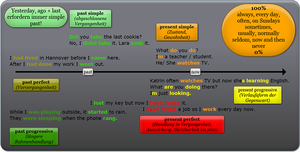Present Simple/He, she, it ...: Unterschied zwischen den Versionen
(akt) |
Markierung: Quelltext-Bearbeitung 2017 |
||
| (10 dazwischenliegende Versionen desselben Benutzers werden nicht angezeigt) | |||
| Zeile 1: | Zeile 1: | ||
Im [[ | {{Aufgabe-en|# Watch the video. What happens to the verbs? | ||
# Do the interactive exercises.<br>(If you're not sure how, go back to the [[Present_Simple#3._Person_Singular|overview]].)}} | |||
{{#ev:youtube|xlDj5aH3Cco}} | |||
{{clear}} | |||
Im [[Present Simple|Present Simple]] gibt es eine Ausnahme: In der [[Present_Simple#3._Person_Singular|3.Person Singular]] wird ein -s angehängt! | |||
=== Peter's morning === | === Peter's morning === | ||
| Zeile 21: | Zeile 27: | ||
[[Datei:Pastperf 01.jpg|alarm clock ringing]] He ''puts (put)'' out the alarm clock and ''wakes (wake)'' up at 11 o clock. | [[Datei:Pastperf 01.jpg|alarm clock ringing]] He ''puts (put)'' out the alarm clock and ''wakes (wake)'' up at 11 o clock. | ||
[[Datei:Pastperf 03.jpg|taking a shower]] He ''washes (wash)'' his hair. Then he (have) a coffee. [[Datei:Pastperf 04.jpg|drinking coffee]] | [[Datei:Pastperf 03.jpg|taking a shower]] He ''washes (wash)'' his hair. Then he ''has (have)'' a coffee. [[Datei:Pastperf 04.jpg|drinking coffee]] | ||
[[Datei:Pastperf 05.jpg|brushing teeth]] After that he ''brushes (brush=clean)'' his teeth. Then he ''goes (go)'' to a friend. | [[Datei:Pastperf 05.jpg|brushing teeth]] After that he ''brushes (brush=clean)'' his teeth. Then he ''goes (go)'' to a friend. | ||
| Zeile 29: | Zeile 35: | ||
=== Mixed Grammar === | === Mixed Grammar === | ||
'''In this exercise you have to choose the correct form. Write the in the gaps:''' | '''In this exercise you have to choose the correct form. Write the word in the gaps:''' | ||
(''In dieser Übung musst Du entscheiden, ob Du ein -s (oder ein -es) angehängen | (''In dieser Übung musst Du entscheiden, ob Du an das Verb ein -s (oder ein -es) angehängen muss.'') | ||
<div class="lueckentext-quiz" lang="en"> | <div class="lueckentext-quiz" lang="en"> | ||
1. In the morning Lewis ''gets (get)'' up at twenty past seven. | 1. In the morning Lewis ''gets (get)'' up at twenty past seven. | ||
2. Lewis '' | 2. Lewis ''goes (go)'' to school on his bike. | ||
3. They ''live (live)'' in a house near the park but his dad '' | 3. They ''live (live)'' in a house near the park but his dad ''lives (live)'' in Manchester. | ||
4. The boys '' | 4. The boys ''play (play)'' football. Then Lewis ''does (do)'' his homework. | ||
</div> | </div> | ||
{{Fortsetzung| | {{Fortsetzung| | ||
weiter= | weiter=Imperativ|weiterlink=Present_Simple/Imperativ| | ||
vorher=Formen von "to be"|vorherlink=Present_Simple/Formen_von_"to_be"}} | |||
vorher= | |||
{{Present Simple}} | |||
| Zeile 56: | Zeile 68: | ||
{{SORTIERUNG:{{SUBPAGENAME}}}} | {{SORTIERUNG:{{SUBPAGENAME}}}} | ||
[[Kategorie:Englisch]] | [[Kategorie:Englisch]] | ||
[[Kategorie: | [[Kategorie:Grammatik]] | ||
Aktuelle Version vom 20. Januar 2023, 05:31 Uhr
- Watch the video. What happens to the verbs?
- Do the interactive exercises.
(If you're not sure how, go back to the overview.)
Im Present Simple gibt es eine Ausnahme: In der 3.Person Singular wird ein -s angehängt!
Peter's morning
Put the verbs into the gaps! (Drag & Drop)
 Every morning the alarm clock rings at 7 o clock.
Every morning the alarm clock rings at 7 o clock.
Then Peter takes a shower  and drinks a coffee.
and drinks a coffee. 
After that he cleans his teeth. 
The bus comes at 20 to eight. ![]() My friend Peter says "Hello!".
My friend Peter says "Hello!".
Sleeping in
Write the verbs into the gaps:
 On Saturday morning my friend Robert usually sleeps (sleep) in (to sleep in =aussschlafen).
On Saturday morning my friend Robert usually sleeps (sleep) in (to sleep in =aussschlafen).
 He puts (put) out the alarm clock and wakes (wake) up at 11 o clock.
He puts (put) out the alarm clock and wakes (wake) up at 11 o clock.
 He washes (wash) his hair. Then he has (have) a coffee.
He washes (wash) his hair. Then he has (have) a coffee. 
 After that he brushes (brush=clean) his teeth. Then he goes (go) to a friend.
After that he brushes (brush=clean) his teeth. Then he goes (go) to a friend.
When he comes home he does (do) his homework. From 4 to 5 o'clock he tidies (tidy) up his room.
Mixed Grammar
In this exercise you have to choose the correct form. Write the word in the gaps:
(In dieser Übung musst Du entscheiden, ob Du an das Verb ein -s (oder ein -es) angehängen muss.)
1. In the morning Lewis gets (get) up at twenty past seven.
2. Lewis goes (go) to school on his bike.
3. They live (live) in a house near the park but his dad lives (live) in Manchester.
4. The boys play (play) football. Then Lewis does (do) his homework.
-s muss mit!
Present Simple
(die einfache Gegenwart)
Past Tense:
Present Tense:




